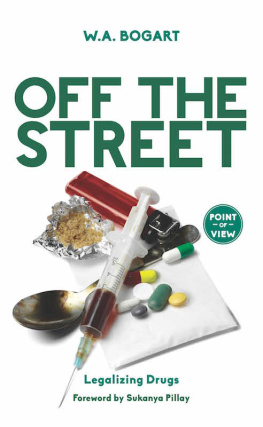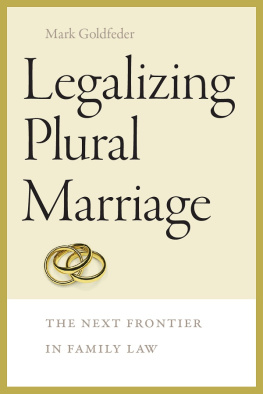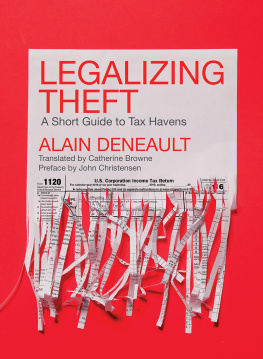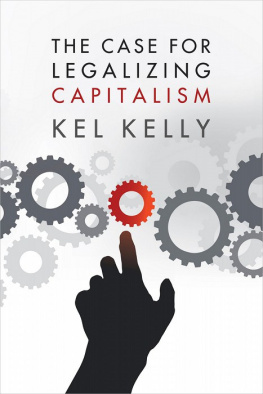Steve Rolles - NoNonsense Legalizing Drugs
Here you can read online Steve Rolles - NoNonsense Legalizing Drugs full text of the book (entire story) in english for free. Download pdf and epub, get meaning, cover and reviews about this ebook. year: 2017, publisher: Between the Lines, genre: Politics. Description of the work, (preface) as well as reviews are available. Best literature library LitArk.com created for fans of good reading and offers a wide selection of genres:
Romance novel
Science fiction
Adventure
Detective
Science
History
Home and family
Prose
Art
Politics
Computer
Non-fiction
Religion
Business
Children
Humor
Choose a favorite category and find really read worthwhile books. Enjoy immersion in the world of imagination, feel the emotions of the characters or learn something new for yourself, make an fascinating discovery.

- Book:NoNonsense Legalizing Drugs
- Author:
- Publisher:Between the Lines
- Genre:
- Year:2017
- Rating:4 / 5
- Favourites:Add to favourites
- Your mark:
- 80
- 1
- 2
- 3
- 4
- 5
NoNonsense Legalizing Drugs: summary, description and annotation
We offer to read an annotation, description, summary or preface (depends on what the author of the book "NoNonsense Legalizing Drugs" wrote himself). If you haven't found the necessary information about the book — write in the comments, we will try to find it.
NoNonsense Legalizing Drugs — read online for free the complete book (whole text) full work
Below is the text of the book, divided by pages. System saving the place of the last page read, allows you to conveniently read the book "NoNonsense Legalizing Drugs" online for free, without having to search again every time where you left off. Put a bookmark, and you can go to the page where you finished reading at any time.
Font size:
Interval:
Bookmark:
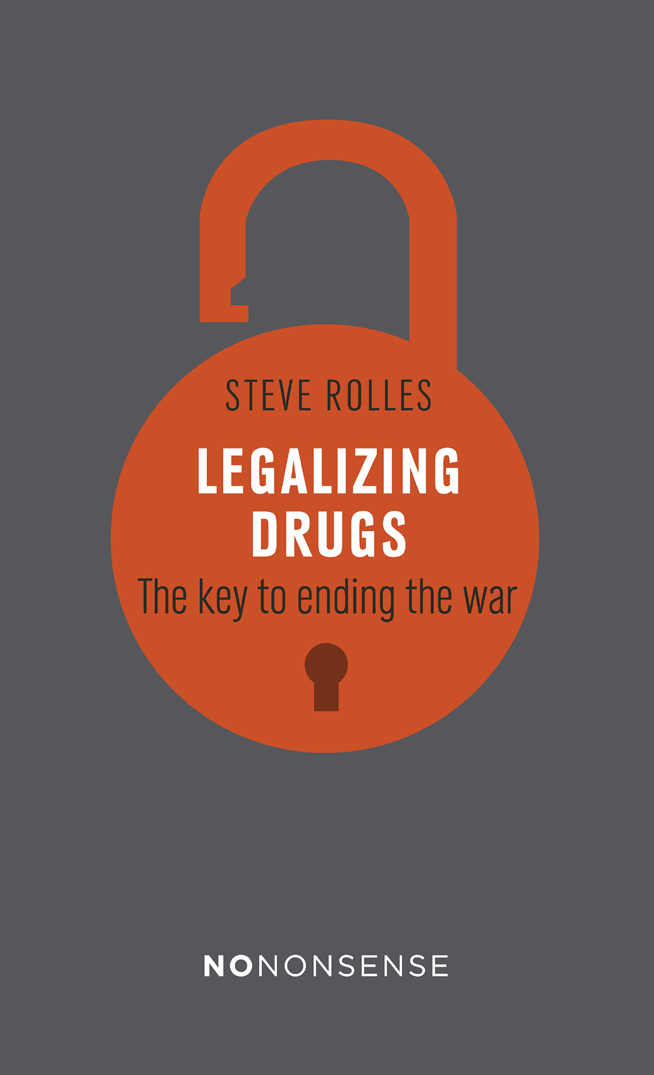

About the author
Steve Rolles has been working on drug policy reform with Transform Drug Policy Foundation for nearly 20 years. As senior policy analyst, he has been the lead author on many of Transforms groundbreaking publications, including 2009s After the War on Drugs: Blueprint for Regulation. He is a regular contributor to the public debate on drug policy and the law in print and broadcast media, and has been a speaker at events, conferences and inquiries in the UK and around the world. He has served as an advisor to the Global Commission on Drugs, a range of UN agencies, and national governments, including Uruguay and Canada on the development of their legal cannabis regulation models. Before joining Transform, Steve worked for the UK Medical Research Council and Oxfam.
Acknowledgements
Thanks to my colleagues at Transform Drug Policy Foundation who contributed to much of the material used in this book: Mike Jay, Danny Kushlick, George Murkin, Martin Powell, Nicky Saunter, Jane Slater, and Lisa Sanchez.
About Transform Drug Policy Foundation
Transform Drug Policy Foundation is a UK-based charity and thinktank, operating internationally, with staff in the UK and Mexico. Transform is actively involved in policy analysis and advocacy work to bring drugs under control through responsible legal regulation of all aspects of the drug trade. Transform aims to equip policymakers and reform advocates with the tools they need to fundamentally change our current approach to drugs and create a healthier, safer world. tdpf.org.uk

NONONSENSE
Legalizing Drugs
The key to ending the war
Published in 2017 in Canada by
New Internationalist Publications
2446 Bank Street, Suite 653
Ottawa, Ontario
K1V 1A8
newint.org
and
Between the Lines
401 Richmond Street West, Studio 281
Toronto, Ontario
M5S 2R4
www.btlbooks.com
First published in 2017 by
New Internationalist Publications Ltd
The Old Music Hall
106-108 Cowley Road
Oxford OX4 1JE, UK
newint.org
Steve Rolles
The right of Steve Rolles to be identified as the author of this work has been asserted in accordance with the Copyright, Designs and Patents Act 1998.
All rights reserved. No part of this book may be reproduced, stored in a retrieval system or transmitted, in any form or by any means, electronic, electrostatic, magnetic tape, mechanical, photocopying, recording or otherwise, without prior permission in writing of the Publisher.
Cover design: Andrew Kokotka
Design concept: Andrew Smith, asmithcompany.co.uk
Series editor: Chris Brazier
Series design by Juha Sorsa
Library and Archives Canada Cataloguing in Publication
Rolles, Steve, author
Legalizing drugs : the key to ending the war / Steve Rolles.
(Nononsense)
Includes index.
Issued in print and electronic formats.
ISBN 978-1-77113-320-3 (softcover).--ISBN 978-1-77113-321-0 (EPUB).--ISBN 978-1-77113-322-7 (PDF)
1. Drug legalization. 2. Narcotic laws. 3. Drug control--Economic aspects. 4. Narcotics. I. Title. II. Series: Nononsense
(Toronto, Ont.)
HV5801.R63 2017 364.1'77 C2016-907432-3 C2016-907433-1
Table of Contents
Contents
We are on the brink of a momentous change in international drug policy that will transform the entire globe. After decades on the margins of the debate, alternatives to prohibition are now not only part of the mainstream high-level debate, but actually becoming a reality, across the Americas and beyond. The work of the Global Commission on Drug Policy (of which I am a proud member) calling for an end to the war on drugs, has had an overwhelmingly positive response, revealing the appetite for change.
I have witnessed the catastrophic failure of the global war on drugs first hand in Colombia and Latin America. Even where successes were achieved drugs seized, cartels defeated and violent criminals jailed either the problems moved elsewhere, or other criminals emerged into the vacuum created. As our security situation improved, so it deteriorated elsewhere. Even as Colombia approaches a new era of peace, we, and our neighbors, still carry a terrible burden of violence and instability fueled by the war on drugs.
There is still much to be done. We can certainly focus our enforcement efforts on reducing the violence and bloodshed, rather than the endless and futile pursuit of eradicating drugs from the world completely. We must also strive for an immediate end to the criminalization of people who use drugs; it neither deters use, nor helps those with drug problems. Decriminalization must be the basis of any effective public-health response.
But these important steps are not enough. If we are to end the destructive criminal drugs market and the chaos it has sown across the world, we must take control of it, and the legalization and regulation of drugs within responsible government agencies is indeed the key to achieving this. We must do this not because drugs are safe, but precisely because they are risky and we seek to manage and reduce those risks. We must deal with the reality of drugs, not some imagined utopia in which they have magically all been eradicated.
Legalization and regulation, as this book makes clear, does not mean an open market. Drugs must be strictly and responsibly regulated according to their risks. We must learn from mistakes we have made with alcohol and tobacco in the past and get it right this time around. We must prioritize public health, human rights, security and development not the interests of profit-making companies.
As the Global Commission has long hoped and predicted, the momentum for reform continues to gather pace. A better world is now there for the taking, one in which drug markets are controlled by governments, not gangsters. There is great cause for optimism as we go forward. I commend this book to you, and encourage all who read it to join the movement for change and help to end the ruinous war on drugs, and the catastrophe it has created.
Csar Gaviria
Former president of Colombia, and member of the Global Commission on Drugs
globalcommissionondrugs.org
People like to take drugs. Whether to feel good, to relieve pain, to relax, or find spiritual solace, seeking altered states of consciousness has been part of our culture since the dawn of humanity. Psychoactive drug use seems to be almost an innate part of the human condition. And, since civilization began, prohibitions on certain drugs and drug-using behaviors have also been a common although by no means ubiquitous feature of the way different societies organize and regulate themselves. Often these prohibitions have been motivated by legitimate concerns about risks to the drug users, or to those around them. But just as often prohibitions have been driven by the interests of those in power who view drug use as a threat to their control of the established order, or who use prohibitions as a form of social control over certain groups or perceived threats.
Around the beginning of the 20th century, as a rapidly industrializing world began to consolidate expanding international trade into new forms of international law and global government so the various efforts to regulate the drug trade and its related risks began to coalesce into a new global drug-control regime. Guided by the temperance instincts of the US, its global hegemonic power in the ascendant within the League of Nations (soon to be United Nations) a new, highly interventionist, global model of drug prohibition emerged in the form of the 1961 United Nations Single Convention on Narcotic Drugs. This new international legal instrument, ratified by almost every country on earth, not only sought to control the medical trade and use of certain drugs, but also to impose punitive sanctions on the production, supply and use of drugs for non-medical uses.
Font size:
Interval:
Bookmark:
Similar books «NoNonsense Legalizing Drugs»
Look at similar books to NoNonsense Legalizing Drugs. We have selected literature similar in name and meaning in the hope of providing readers with more options to find new, interesting, not yet read works.
Discussion, reviews of the book NoNonsense Legalizing Drugs and just readers' own opinions. Leave your comments, write what you think about the work, its meaning or the main characters. Specify what exactly you liked and what you didn't like, and why you think so.


